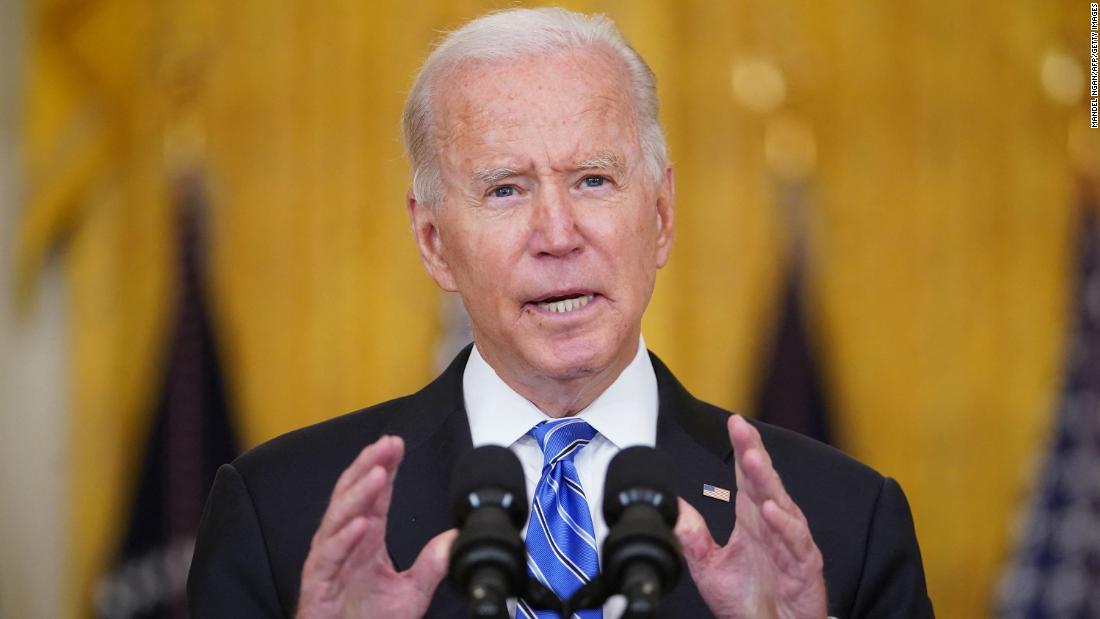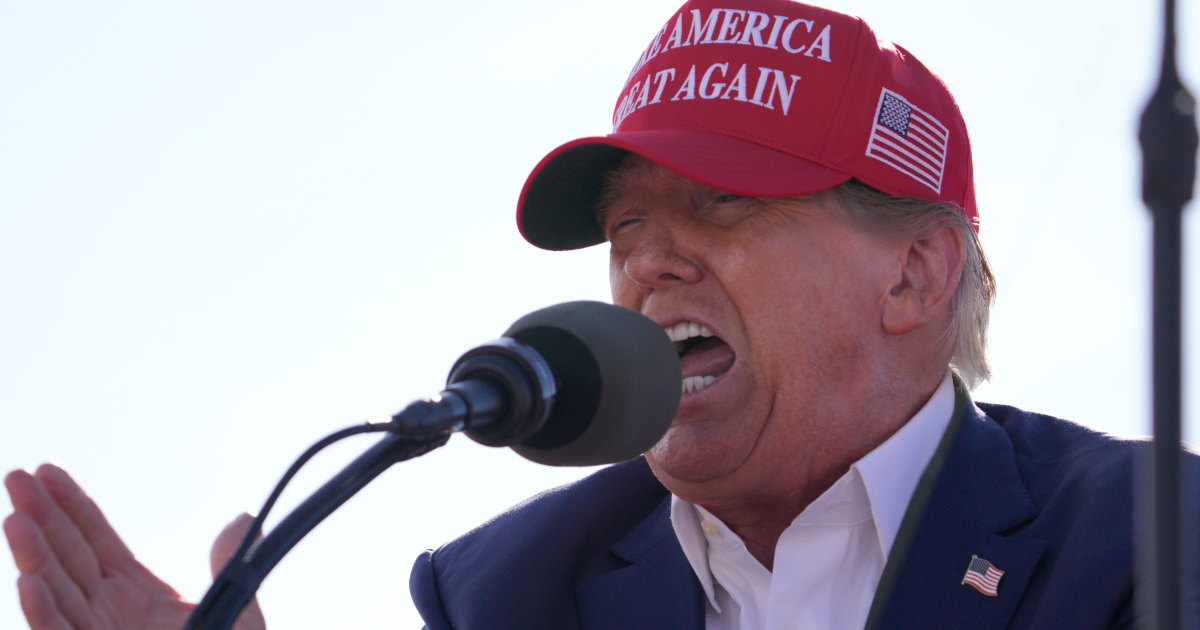Biden: Infrastructure Plan Will Transform America 0:59
(CNN) -
Every president since George W. Bush has said it's time to leave Afghanistan and dedicate himself to nation-building at home.
But only Joe Biden is pulling it off.
His massive gamble on more than $ 4.5 trillion in infrastructure spending and a way out of America's longest war, which threatens to unleash a foreign policy disaster, is unfolding in a dramatic August that could define his presidency. .
Along with these twin historical impulses, the history of the Biden administration is also being shaped by a resurgence of the pandemic that he thought he had overcome and is deepening the national political divide he promised to heal.
These simultaneous moments of tension reflect extreme times, but they also show the 78-year-old commander-in-chief blazing a bold path and implementing the personal goals he harbored for decades in Washington.
The Senate approval of a $ 1.2 trillion bipartisan traditional infrastructure package was a major victory for Biden on Tuesday and validated his promise to try to heal bitter divisions and mistrust in a nation at political war with itself. .
A $ 3.5 trillion supplemental budget resolution focused on "human" infrastructure passed the Senate with only Democratic votes early Wednesday and could reshape the American economy and society by funding health care at home, community colleges. and climate initiatives.
advertising
Five things you didn't know were in the infrastructure bill
The bills still face a complicated future in Congress before they become law.
But they represent Biden's most important statement of his belief that the power of government can be wielded to help American workers.
The spending, one of the most important government efforts to alleviate poverty and economic pain in decades, is also an attempt to drain the feeling that the country had failed millions of central U.S. Americans - a sentiment. which helped fuel the populist outbreak that led to the election of Donald Trump in 2016.
"I am committed to ensuring that our historic economic recovery ... this time reaches out to everyone and eases the burden on working families, not just this year, but for years to come," Biden said Wednesday.
But as with his policy in Afghanistan, Biden also faces significant risks.
Republicans are already taking advantage of the spending explosion to portray Democrats as libertines and dedicated to breaking the deficit "in the style of socialism" in a bid to weaken their enemies in next year's Congressional elections.
Terrible news in Afghanistan
Is the Taliban's advance in Afghanistan a risk to the world?
1:02
Biden's Senate triumph unfolded as news from Afghanistan became increasingly alarming and the likelihood of a Taliban takeover increases, which will be seen as the direct consequence of Biden's decision to carry out home to all American troops. It can also be seen by foreign enemies as a humiliation and a sign of the weakening of American power.
The lightning advance of the Taliban, defeated by US troops 20 years ago for harboring Osama bin Laden, has shocked everyone in Washington.
Now it has taken over nine provincial capitals, including the country's second-largest city, Kandahar.
Foreign embassies are discussing improvisations and there are signs that the capital Kabul could fall, ending a democratic dream bought with the blood of thousands of Americans.
ANALYSIS |
Fear and resentment reign in Afghanistan as the Taliban invade more cities
Any equivalent image of American helicopters emerging from the roof of the United States embassy in Saigon in the retreat from the Vietnam War could become emblematic of the Biden presidency, as well as a possible future bipartisan signing ceremony with the Republicans in the White House for the infrastructure bill.
The potential downsides of a pullout from Afghanistan help explain why former Presidents Barack Obama and Trump ultimately decided they couldn't fulfill their ambitions to end that war.
"America, it's time to focus on nation-building here at home," Obama said in a White House speech in June 2011, when he announced that he would withdraw 10,000 troops from Afghanistan later that year.
But at the end of his second term, the former president cut back on his last effort to end the war when he decided he could keep 8,400 soldiers there until he left office.
He justified his decision by saying that the security situation was precarious amid the Taliban's advances and that the Afghan government needed more time to build its forces.
Trump was no less enthusiastic about ordering American forces back, having taken advantage of America's exhaustion from a decade and a half of foreign wars to help fuel his 2016 election campaign.
For years, he had criticized the deployment in Afghanistan.
"I agree with President Obama on Afghanistan. We should have a quick pullout. Why should we keep wasting our money? Rebuild America," Trump tweeted in 2013.
But Trump, like Obama, found that vowing to end wars created difficult expectations for his presidency.
In 2017, the United States garrison increased to combat terrorism.
By the time he left office, he had turned the war sour again and reached an agreement with the Taliban that they would see all American troops leave by May 1, a deadline that Biden slightly extended.
The current president plans to mark the 20th anniversary of the September 11 attacks by saying that it ended America's involvement in the "Eternal War."
But it seems likely that he will be greeted with a split screen of the Taliban's victories in Afghanistan.
Where Trump and Obama failed in infrastructure
Both Obama and Trump also wrestled with the other half of Biden's double game this week: infrastructure reform.
"We must rebuild our infrastructure and find new, clean energy sources," Obama said in that same 2011 White House speech, but was unable to mount a serious push for a bill as Republicans used the power of Congress to repress your agenda.
Biden Announces New Emission Standards, Aiming for 50% of US Vehicles Sold by 2030 to Be Electric
After making a fortune as a builder, Trump was deemed ideally positioned to pass his own infrastructure bill, especially as Democrats were eager to find something they could agree on.
But his failed efforts degenerated into self-parody when a series of themed "infrastructure weeks" collapsed on his own poor discipline and the wild chaos and upheavals of his west wing.
The blame for the disaster in Afghanistan is not all Biden's fault.
The failure of nation-building and viable armed forces has its roots in four administrations.
After all, American forces won the war against the Taliban and defeated Al Qaeda within months of the 9/11 attacks.
Then the United States and its allies spent the next 19 years losing the peace, including a diversion to Iraq.
CNN reported Wednesday that the Taliban could isolate Kabul in the next 30 to 60 days.
His return would once again raise the question of whether Afghanistan could be a haven for terrorist groups planning attacks against the United States.
ANALYSIS |
Things are looking bad in Afghanistan, even with the presence of US air power.
In 21 days, they could look a lot worse
If the chaos in Afghanistan worsens, Biden will have to answer for the brutal seizure of power by the Taliban, a fundamentalist group that represses the rights of women and girls and implements a harsh form of sharia.
Biden, who has long been skeptical about the prolonged US troop presence in Afghanistan, is nonetheless adamant that the increasingly dark outlook in Central Asia will not change his mind.
"No," he replied on Tuesday when asked by a reporter if current events would alter his exit plan.
Instead, the president stressed that the Afghans provide their own security, backed by air strikes and US funding.
"They have to fight for themselves, they have to fight for their nation ... they have to want to fight," Biden said.
His response may seem callous given that millions of Afghans face a return to the dark ages of the feudal rule of the Taliban.
But it represents a cold judgment of America's national security interests, a sort of "America First" updated for the Biden era.
Biden rejects the notion that the United States needs to stay in Afghanistan now for the same reason it always did: to prevent the lawless and war-torn nation from once again becoming a terrorist haven that could threaten the American homeland.
It is true that an extremist group could choose any number of failed states to form a base.
And while the fight against Islamic extremism was a signature of international relations two decades ago, it has been replaced by a new era of great power competition and cyber conflict with nation states like China and Russia.
There is a cyber war going on today, although not much is said about it
Ultimately, Biden has come to the conclusion that if America doesn't leave now, it will never leave.
"When is the right time to go?" Biden asked in April.
His "if now not then when" attitude also appears to be driving the president's use of what may be a narrow window of political power, with midterm elections looming next year, to fulfill his infrastructure ambitions as well. .
CNN's Barbara Starr, Kylie Atwood, and Jennifer Hansler contributed to this report.
Joe biden







